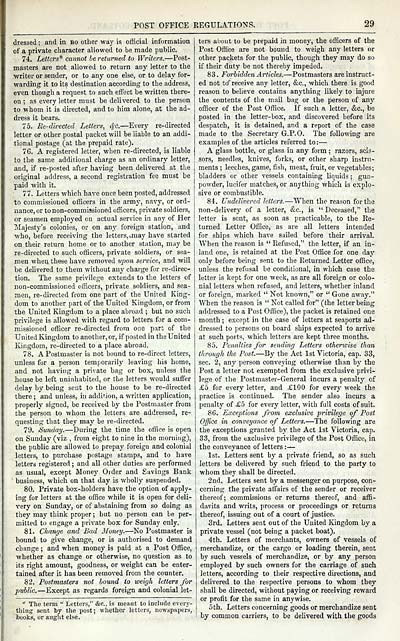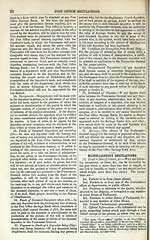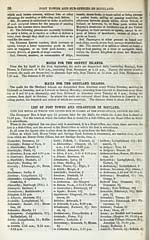Download files
Complete book:
Individual page:
Thumbnail gallery: Grid view | List view

POST OFFICE REGULATIONS.
29
dressed : and in ho other way is official information
of a private character allowed to be made public.
74. Letters* cannot he returned to Writers. — Post-
masters are not allowed to return any letter to the
■writer or sender, or to anj' one else, or to delay for-
warding it to its destination according to the address,
even though a request to such effect be written there-
on ; as every letter must be delivered to the person
to whom it is directed, and to him alone, at the ad-
dress it bears.
75. Re-directed Letters, ij-c. — Every re-directed
letter or other postal packet will be liable to an addi-
tional postage (at the prepaid rate).
76. A registered letter, when re-directed, is liable
to the same additional charge as an ordinary letter,
and, if re-posted after having been delivered at the
original address, a second registration fee must be
paid with it.
77. Letters which have once been posted, addressed
to commissioned oiScers in the army, navy, or ord-
nance, or to non-commissioned officers, private soldiers,
or seamen employed on actual service in any of Her
Majest3''s colonies, or on anj' foreign station, and
who, before receiving the letters,,may have started
on their return home or to another station, may be
re-directed to such officers, private soldiers, or sea-
men when these have removed iqwn service, and will
be delivered to them without any charge for re-direc-
tion. The same privilege extends to the letters of
non-commissioned officers, private soldiers, and sea-
men, re-directed from one part of the United King-
dom to another part of the United Kingdom, or from
the United Kingdom to a place abroad ; but no such
privilege is allowed with regard to letters for a com-
missioned officer re-directed from one part of the
United Kingdom to another, or, if posted in the United
Kingdom, re-directed to a place abroad.
78. A Postmaster is not bound to re-dircct letters,
unless for a person temporarily leaving his home,
and not having a private bag or box, unless the
house be left uninhabited, or the letters would suffer
delay by being sent to the house to be re-directed
there ; and unless, in addition, a written application,
properly signed, be received by the Postmaster from
the person to whom the letters are addressed, re-
questing that they may be re-directed.
79. Sunday. — During the time the office is open
on Sunday (viz , from eight to nine in the morning),
the public are allowed to prepaj^ foreign and colonial
letters, to purchase postage stamps, and to have
letters registered ; and all other duties are performed
as usual, except Money Order and Savings Bank
business, which on that day is wholly suspended.
80. Private box-holders have the option of apply-
ing for letters at the office while it is open for deli-
very on Sunday, or of abstaining from so doing as
they may think proper ; but no person can be per-
mitted to engage a private box for Sunday only.
81. Change and Bad Money. — No Postmaster is
bound to give change, or is authorised to demand
change ; and when money is paid at a Post Office,
whether as change or otherwise, no question as to
its right amount, goodness, or weight can be enter-
tained after it has been removed from the counter.
82. Postmasters not hound to weigh letters for
public. — Except as regards foreign and colonial let-
* The term " Letters," &c.. Is meant to include everj--
tbing sent by the post; whether letters, newspapers,
books, or aught else.
ters about to be prepaid in money, the officers of the
Post Office are not bound to weigh any letters or
other packets for the public, though they may do so
if their duty be not thereby impeded.
83. Forbidden Articles. — Postmasters are instruct-
ed not to' receive any letter, &c., which there is good
reason to believe contains anj'thing likely to injure
the contents of the mail bag or the person of any
officer of the Post Office. If such a. letter, &c., be
posted in the letter-box, and discovered before its
despatch, it is detained, and a report of the case
made to the Secretary G.P.O. The following are
examples of the articles referred to : —
A glass bottle, or glass in any form ; razors, scis-
sors, needles, knives, forks, or other sharp instru-
ments ; leeches, game, fish, meat, fruit, or vegetables;
bladders or other vessels containing liquids ; gun-
powder, lucifer matches, or anything which is explo-
sive or combustible.
84-. Undelivered letters. — When the reason for the
non-delivery of a letter, &c., is " Deceased," the
letter is sent, as soon as practicable, to the Re-
turned Letter Office, as are all letters intended
for ships which have sailed before their arrival.
When the reason is " Refused," the letter, if an in-
land one, is retained at the Post Office for one day
only before being sent to the Returned Letter office,
unless the refusal be conditional, in which case the
letter is kept for one week, as are all foreign or colo-
nial letters when refused, and letters, whether inland
or foreign, marked " Not known," or " Gone away."
When the reason is " Not called for" (the letter being
addressed to a Post Office), the packet is retained one
month ; except in the case of letters at seaports ad-
dressed to persons on board ships expected to arrive
at such ports, which letters are kept three months.
85. Penalties for sending Letters otherioise than
through the Post. — By the Act 1st Victoria, cap. 33,
sec. 2, any person conveying otherwise than by the
Post a letter not exempted from the exclusive privi-
lege of the Postmaster-General incurs a penalty of
£o for every letter, and £100 for every week the
practice is continued. The sender also incurs a
penalty of £5 for every letter, with full costs of suit.
86. Exceptions from exclusive privilege of Post
Office in conveyance of Letters. — The following are
the exceptions granted bj"^ the Act 1st Victoria, cap.
33, from the exclusive privilege of the Post Office, in
the conveyance of letters : —
1st. Letters sent by a private friend, so as such
letters be delivered by such friend to the party to
whom they shall be directed.
2nd. Letters sent by a messenger on purpose, con-
cerning the private affairs of the sender or receiver
thereof; commissions or returns thereof, and affi-
davits and writs, process or proceedings or returns
thereof, issuing out of a court of justice.
3rd. Letters sent out of the United Kingdom by a
private vessel (not being a packet boat).
4th. Letters of merchants, o\Fners of vessels of
merchandize, or the cargo or loading therein, sent
by such vessels of merchandize, or by any person
employed by such owners for the carriage of such
letters, according to their respective directions, and
delivered to the respective persons to whom they
shall be directed, without paying or receiving reward
or profit for the same in anywise.
5th. Letters concerning goods or merchandize sent
by common carriers, to be delivered with the goods
29
dressed : and in ho other way is official information
of a private character allowed to be made public.
74. Letters* cannot he returned to Writers. — Post-
masters are not allowed to return any letter to the
■writer or sender, or to anj' one else, or to delay for-
warding it to its destination according to the address,
even though a request to such effect be written there-
on ; as every letter must be delivered to the person
to whom it is directed, and to him alone, at the ad-
dress it bears.
75. Re-directed Letters, ij-c. — Every re-directed
letter or other postal packet will be liable to an addi-
tional postage (at the prepaid rate).
76. A registered letter, when re-directed, is liable
to the same additional charge as an ordinary letter,
and, if re-posted after having been delivered at the
original address, a second registration fee must be
paid with it.
77. Letters which have once been posted, addressed
to commissioned oiScers in the army, navy, or ord-
nance, or to non-commissioned officers, private soldiers,
or seamen employed on actual service in any of Her
Majest3''s colonies, or on anj' foreign station, and
who, before receiving the letters,,may have started
on their return home or to another station, may be
re-directed to such officers, private soldiers, or sea-
men when these have removed iqwn service, and will
be delivered to them without any charge for re-direc-
tion. The same privilege extends to the letters of
non-commissioned officers, private soldiers, and sea-
men, re-directed from one part of the United King-
dom to another part of the United Kingdom, or from
the United Kingdom to a place abroad ; but no such
privilege is allowed with regard to letters for a com-
missioned officer re-directed from one part of the
United Kingdom to another, or, if posted in the United
Kingdom, re-directed to a place abroad.
78. A Postmaster is not bound to re-dircct letters,
unless for a person temporarily leaving his home,
and not having a private bag or box, unless the
house be left uninhabited, or the letters would suffer
delay by being sent to the house to be re-directed
there ; and unless, in addition, a written application,
properly signed, be received by the Postmaster from
the person to whom the letters are addressed, re-
questing that they may be re-directed.
79. Sunday. — During the time the office is open
on Sunday (viz , from eight to nine in the morning),
the public are allowed to prepaj^ foreign and colonial
letters, to purchase postage stamps, and to have
letters registered ; and all other duties are performed
as usual, except Money Order and Savings Bank
business, which on that day is wholly suspended.
80. Private box-holders have the option of apply-
ing for letters at the office while it is open for deli-
very on Sunday, or of abstaining from so doing as
they may think proper ; but no person can be per-
mitted to engage a private box for Sunday only.
81. Change and Bad Money. — No Postmaster is
bound to give change, or is authorised to demand
change ; and when money is paid at a Post Office,
whether as change or otherwise, no question as to
its right amount, goodness, or weight can be enter-
tained after it has been removed from the counter.
82. Postmasters not hound to weigh letters for
public. — Except as regards foreign and colonial let-
* The term " Letters," &c.. Is meant to include everj--
tbing sent by the post; whether letters, newspapers,
books, or aught else.
ters about to be prepaid in money, the officers of the
Post Office are not bound to weigh any letters or
other packets for the public, though they may do so
if their duty be not thereby impeded.
83. Forbidden Articles. — Postmasters are instruct-
ed not to' receive any letter, &c., which there is good
reason to believe contains anj'thing likely to injure
the contents of the mail bag or the person of any
officer of the Post Office. If such a. letter, &c., be
posted in the letter-box, and discovered before its
despatch, it is detained, and a report of the case
made to the Secretary G.P.O. The following are
examples of the articles referred to : —
A glass bottle, or glass in any form ; razors, scis-
sors, needles, knives, forks, or other sharp instru-
ments ; leeches, game, fish, meat, fruit, or vegetables;
bladders or other vessels containing liquids ; gun-
powder, lucifer matches, or anything which is explo-
sive or combustible.
84-. Undelivered letters. — When the reason for the
non-delivery of a letter, &c., is " Deceased," the
letter is sent, as soon as practicable, to the Re-
turned Letter Office, as are all letters intended
for ships which have sailed before their arrival.
When the reason is " Refused," the letter, if an in-
land one, is retained at the Post Office for one day
only before being sent to the Returned Letter office,
unless the refusal be conditional, in which case the
letter is kept for one week, as are all foreign or colo-
nial letters when refused, and letters, whether inland
or foreign, marked " Not known," or " Gone away."
When the reason is " Not called for" (the letter being
addressed to a Post Office), the packet is retained one
month ; except in the case of letters at seaports ad-
dressed to persons on board ships expected to arrive
at such ports, which letters are kept three months.
85. Penalties for sending Letters otherioise than
through the Post. — By the Act 1st Victoria, cap. 33,
sec. 2, any person conveying otherwise than by the
Post a letter not exempted from the exclusive privi-
lege of the Postmaster-General incurs a penalty of
£o for every letter, and £100 for every week the
practice is continued. The sender also incurs a
penalty of £5 for every letter, with full costs of suit.
86. Exceptions from exclusive privilege of Post
Office in conveyance of Letters. — The following are
the exceptions granted bj"^ the Act 1st Victoria, cap.
33, from the exclusive privilege of the Post Office, in
the conveyance of letters : —
1st. Letters sent by a private friend, so as such
letters be delivered by such friend to the party to
whom they shall be directed.
2nd. Letters sent by a messenger on purpose, con-
cerning the private affairs of the sender or receiver
thereof; commissions or returns thereof, and affi-
davits and writs, process or proceedings or returns
thereof, issuing out of a court of justice.
3rd. Letters sent out of the United Kingdom by a
private vessel (not being a packet boat).
4th. Letters of merchants, o\Fners of vessels of
merchandize, or the cargo or loading therein, sent
by such vessels of merchandize, or by any person
employed by such owners for the carriage of such
letters, according to their respective directions, and
delivered to the respective persons to whom they
shall be directed, without paying or receiving reward
or profit for the same in anywise.
5th. Letters concerning goods or merchandize sent
by common carriers, to be delivered with the goods
Set display mode to: Large image | Transcription
Images and transcriptions on this page, including medium image downloads, may be used under the Creative Commons Attribution 4.0 International Licence unless otherwise stated. ![]()
| Scottish Post Office Directories > Towns > Glasgow > Post-Office annual Glasgow directory > 1865-1866 > (685) |
|---|
| Permanent URL | https://digital.nls.uk/84379580 |
|---|
| Description | Directories of individual Scottish towns and their suburbs. |
|---|
| Description | Around 700 Scottish directories published annually by the Post Office or private publishers between 1773 and 1911. Most of Scotland covered, with a focus on Edinburgh, Glasgow, Dundee and Aberdeen. Most volumes include a general directory (A-Z by surname), street directory (A-Z by street) and trade directory (A-Z by trade). |
|---|


